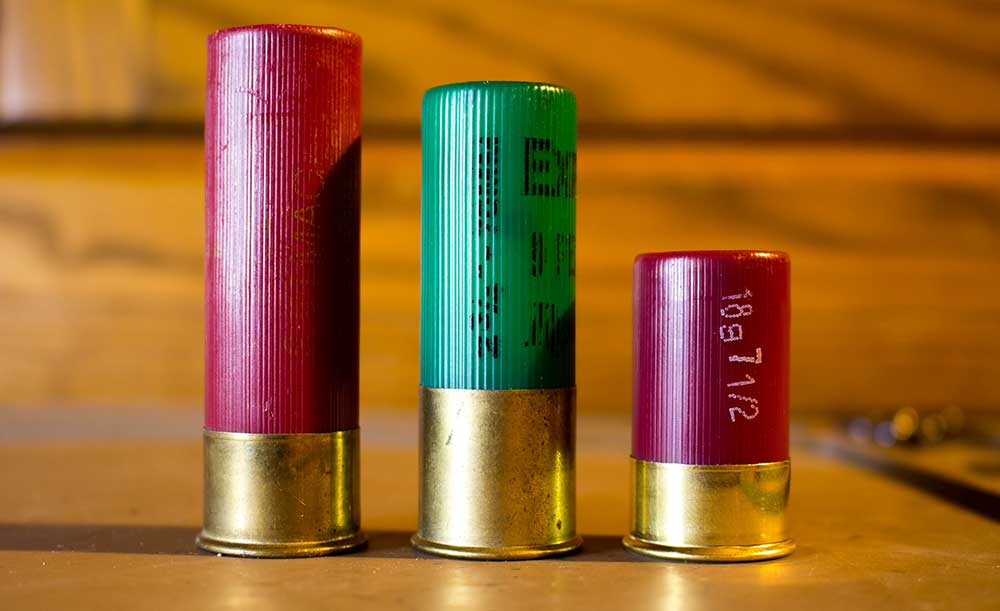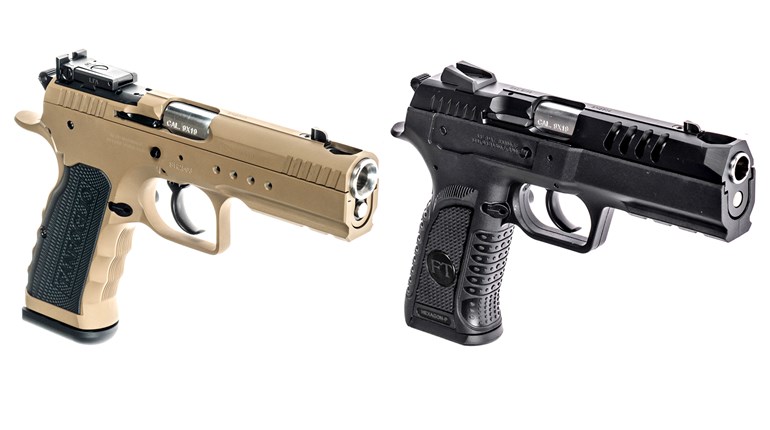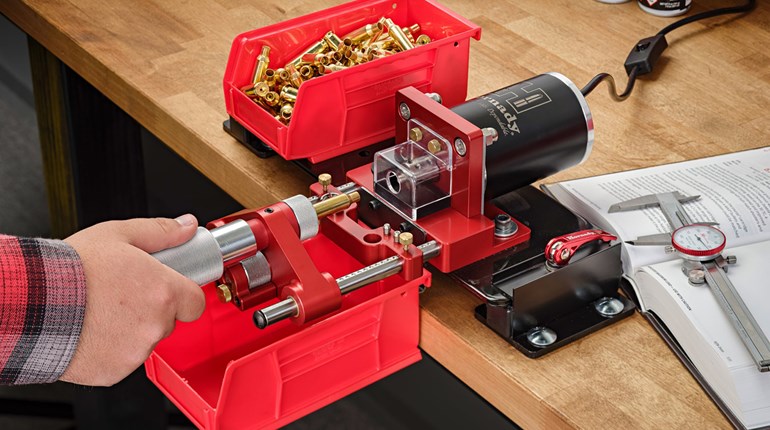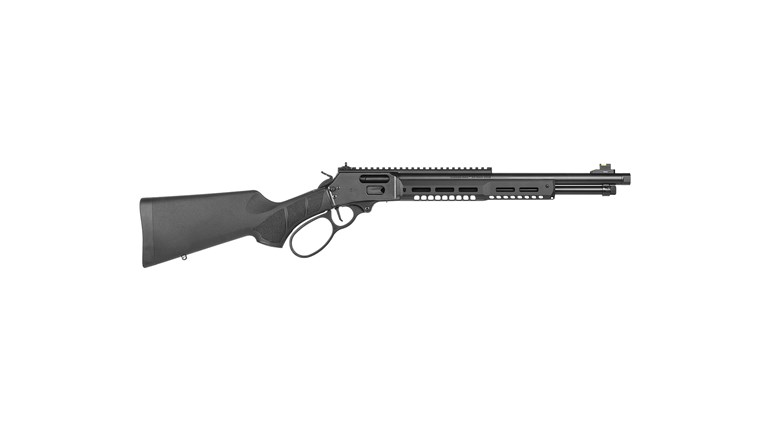
Recoil. It can be the bane of a new shooter, and some seasoned shooters never conquer it. The old adage of “if you can’t shoot straight, shoot often” doesn’t exactly hold water in a home-defense situation, as there are inherent risks in that plan, namely your loved ones. Using a shotgun as a defensive weapon is not a bad idea, but the recoil from shorter 2.75-inch buckshot loads can be severe, so what should the recoil-shy shooter do? Why, take a look at shorter shells, of course.
While the most common 12-gauge shotshells are 2.75, 3 and 3.5 inches in length. There are also English 2.5-inch shells, but Aguila’s 1.75-inch Minishells offer a reasonable solution to the recoil issue. And with the company's lineup, there are plenty of different payload options.

Too many people propagate the idea that a shotgun is the type of gun that you point in the general direction of your target and let the pattern do the work; this just isn’t true and can easily result in a miss. So proper training with a shotgun is required in order to achieve proper results. Practicing with full-house loads–though necessary–can cause a flinch in a new shooter, and that’s a hard habit to break. Using a smaller-gauge shotgun, such as a 28-gauge or .410-Bore, is one means of managing recoil, but it sure would be nice to be able to practice with the gun you intend to use to defend your life. Enter the Minishells, with 12-gauge loads of birdshot, buckshot and slug.
Now before we get in to the details of the Minishell’s performance, let me give you one caveat–certain shotguns just won’t feed these shotshells. Of course, they’ll be fine in single-barrel and double-barrel guns, but I haven’t found a single semiautomatic which will cycle properly with the Minishells, other than a purpose-built model like the SRM Arms 1228 reviewed here. Pump guns are hit or miss as well; the one I've found which will work with the 1.75-inch shells best is the Remington 870 Wingmaster and 870 Express.

The Mossberg 500 and 590 will feed these little guys, providing you use an adapter, and I have used the simple OPSol Mini-Clip 2.0 with great effect. You just slightly compress the adapter, slip into the back of the receiver and you’re in business, though larger 2.75- and 3-inch shells won’t cycle with the adapter in place. The OPSol adapter works only with the Mossberg pump guns–500, 500A, 590 and Shockwave–but it works very well. As an aside, the OPSol website refers to the stubby little Minishells as “Hater Tots”, and I feel we should all adopt that term.
Whether you need to single-feed the Minishells or you have a shotgun that will cycle them, they can still be an effective means of either training a new shooter or allowing a recoil-sensitive shooter to enjoy a day afield.

The Minishell slug–at 7/8 ounce or 385 grains–is moving along at 1,300 fps for 1,444 foot-pounds of energy at the muzzle and will cleanly take deer at close ranges, say out to 50 yards or so. My old Remington 870 Express with an improved cylinder choke tube installed shot these very well for a smoothbore, and while it was not a tack-driver, it was accurate enough for close hunting. The recoil was wonderfully absent, and I wouldn’t hesitate to let the kids use this combination. At 30 yards, off a set of Primos’ shooting sticks, I could keep three inside of 5 inches. While this is certainly not hair-splitting accuracy, it will suffice.
The Aguila Minishell birdshot load used a 5/8 ounce load of No. 7 ½ shot at 1,200 fps, and this is perfect for cottontail rabbits or smaller game birds. I tested the first couple of shells and immediately handed the gun to my dad, who was equally amazed at the lack of recoil as he was at the length of the little shells. For a hunter who loves to hunt cottontails over beagles–count me among that lot–and is tired of spitting excess shot from his rabbit dinner, these Minishells may solve the problem. The No. 7 ½ load is also an excellent tool for training someone new to skeet shooting, as the resulting report and recoil is so low that the proper follow-through can be taught much more easily.

Lastly, my personal favorite of the group is the Aguila buckshot load. Using a blend of No. 4 Buck (seven pellets) and No. 1 Buck (four pellets) at a muzzle velocity of 1,200 fps, the short shell length allows for more rounds in the tubular magazine of a pump gun. The reduced payload makes sense to me inside the home, where a 3-inch magnum load of 41 No. 4 Buck pellets could run the risk of injuring one of your loved ones.
I stuffed a bunch in the tube of a short-barreled Mossberg 590 to replicate an “at-home” experience, and was very pleased with the results. At 10 yards–probably longer than any in-house confrontation would occur–I got a 10-inch pattern from the improved cylinder barrel, more than sufficient to keep the pattern in a human silhouette yet wide enough to take advantage of the benefits of the scattergun. That long tube holds 13 Minishells, and if I need more firepower than that, I may have to call for reinforcements.

Are the Aguila Minishells going to replace your lineup of standard-length shotshells? Certainly not, but they are most definitely handy for use in specific applications, such as with elderly shooters, those who have severe aversion to recoil, for the eradication of garden pests and use as a home defense tool. Lastly, they’re just plain fun to shoot as a pleasant break from crushing recoil. Pick up a box or two and have some fun.
All three loads come in boxes of 20 shells, with a street price of between $11 and $14 per box.




































